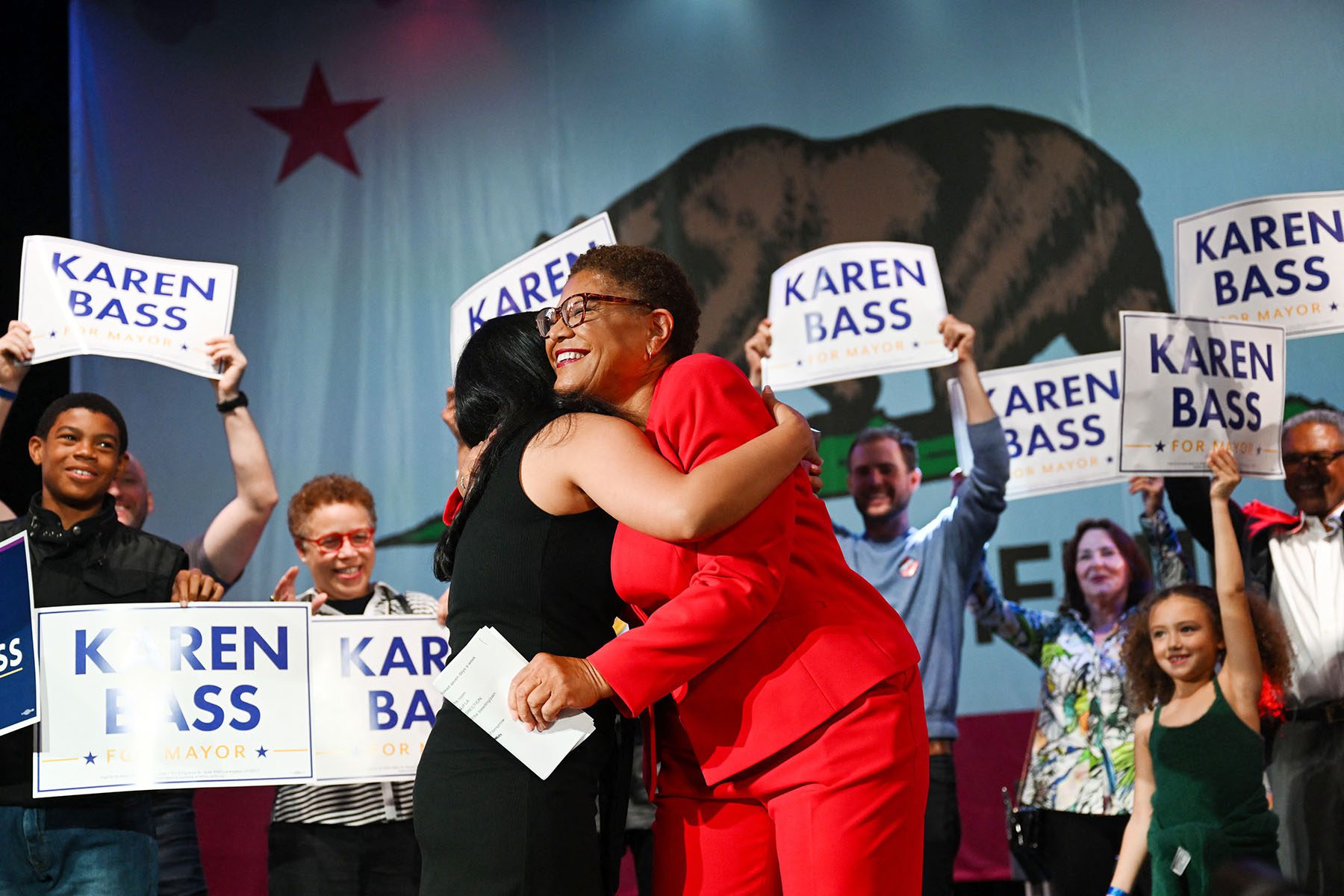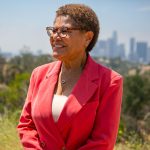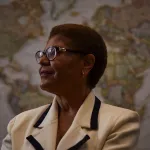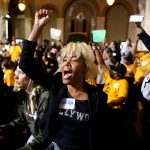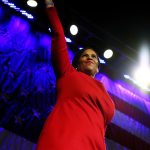We’re making sense of the midterms. Subscribe to our daily newsletter for election context and analysis.
Karen Bass has made history, defeating billionaire real estate developer Rick Caruso to become the first woman — and the first Black woman — elected mayor of Los Angeles, Decision Desk HQ projects.
Bass garnered 53 percent of the vote to Caruso’s 47 percent. Although Bass is a veteran politician — she was elected to California’s 47th Assembly district in 2004 and to Congress in 2010 — her victory against Caruso was far from assured. Having never held political office, Caruso poured roughly $100 million of his own money into the mayoral campaign, outspending Bass 13 to 1. His immense wealth and real estate background drew comparisons to former President Donald Trump, although Caruso ran for mayor as a Democrat after years of registering as a Republican or an Independent.
On Thursday, Bass gave her first press conference since she was named the projected winner. Speaking before a crowd outside the Wilshire Ebell Theatre in Central Los Angeles, she made it clear that she recognized the historic nature of her campaign and that she planned to address the issues Angelenos have listed as pressing concerns—homelessness, cost of living and crime.
“Our City of Angels was founded 241 years ago, and for 128 of those years, since 1894, the Ebell of Los Angeles has been dedicated to uplifting the women of the city, and so it is with a special feeling in my heart, and, with the thoughts of my mother and my daughters and all of the women in this city, that I stand before you in this place as the next mayor of Los Angeles.”
Bass made a point to mention her late daughter and son-in-law, Emilia Bass-Lechuga and Michael Wright, who died in a 2006 car crash. She has discussed previously how this tragedy connects her to President Joe Biden, who lost a wife and child in an automobile accident. Bass was on Biden’s list of potential running mates during his 2020 presidential campaign.
Having served in Congress since 2011, Bass said that she would have to let the reality “sink in” that she will be L.A.’s next mayor. Her first order of business, she explained, will be to take action against homelessness, a problem the pandemic has worsened in the city.
“It’s time for change, and it’s time for urgency,” Bass said. “Tonight 40,000 Angelenos will sleep without a home and five might not wake up. Many Angelenos do not feel safe in their neighborhoods, and families are being priced out of their communities. This must change, and so to the people of Los Angeles, my message is we are going to solve homelessness. We’re going to prevent and respond urgently to crime. And Los Angeles will no longer be unaffordable for working families; good jobs and affordable housing are on the way now.”
She said that Los Angeles plays too pivotal a role in the nation’s economy, as home to the nation’s busiest port, the largest municipal utility and as an entertainment industry leader, for unhoused people to die on the city’s streets. “And we cannot accept,” she added, “that some of our neighborhoods in this city have been designated as the most overcrowded neighborhoods in the nation.”
Since neither Bass nor Caruso won at least 50 percent of the vote during the June 7 Los Angeles primary, they had to face off against each other in November. Caruso’s mayoral bid garnered national headlines after he landed endorsements from high-profile celebrities, including Snoop Dogg, Gwyneth Paltrow and Katy Perry. Bass, however, drew support from the nation’s political elite, including President Joe Biden, Vice President Kamala Harris and former President Barack Obama, who endorsed her with less than two weeks left in the race. Harris, meanwhile, stumped for Bass at a “Get Out the Vote” rally at the University of California, Los Angeles, on November 7 and appeared with Bass, First Gentleman Doug Emhoff and actress Kerry Washington in Los Angeles on Election Day.
Like Trump, Caruso billed himself as a candidate who could shake up the political establishment, framing Bass as a political insider who would offer the status quo. While campaigning, he heavily courted the Latinx community, which makes up nearly half of Los Angeles but is underrepresented in the electorate. Caruso focused his voter outreach in traditionally Latinx neighborhoods such as Boyle Heights, winning the endorsement of the Avance Democratic Club, a liberal Latino group. During an October political debate with Bass, he raised eyebrows for challenging the idea that he is a White man, referring to himself as “Latin.” Caruso is Italian American.
Bass pledged to serve as mayor of all Los Angeles, including voters who preferred Caruso to her. She called her mayoral run a “tough campaign” and mentioned plans to foster a relationship with Caruso in the future. She said that she ran for mayor because she was inspired to solve problems, much like her late colleague, John Lewis— the Georgia congressman and civil rights activist.
“John Lewis used to always say… ‘It was your responsibility to make a way out of no way,’” Bass said.
Bass and her supporters had questioned Caruso’s political credentials, noting that he was a longtime Republican who changed his party affiliation just weeks before launching his mayoral bid in liberal Los Angeles. Bass also questioned whether Caruso was truly pro-choice. He has donated to anti-choice politicians previously and was quoted in a 2007 interview saying that he generally opposed abortion. In response to the criticism, the Caruso campaign said that the candidate has always been pro-choice. Reproductive rights have taken on significance nationwide after the Supreme Court reversed Roe v. Wade in June, leaving states to grant abortion access to residents. In California, a proposition was included on the midterm ballot that allowed voters to amend the state constitution to include reproductive rights. That measure passed.
Homelessness, however, is the issue an overwhelming majority of Angelenos view as a top concern, according to surveys. Caruso’s campaign platform included an aggressive plan to curb homelessness in his first year in office. With an anti-homelessness plan of her own, Bass repeatedly asked why her rival, well known for L.A.-area malls The Grove and The Americana at Brand, never built one unit of affordable housing prior to his mayoral run.
In October, a City Hall scandal drew national attention to Los Angeles. A recording was released of the City Council’s first Latina president, along with two Latino councilmen and a Latino labor leader, making disparaging remarks about a Black child, that child’s White gay councilman father and Indigenous people. Both Bass and Caruso called for those involved in the scandal to step down. But Bass cited her past experience as the founder of the Community Coalition, an organization that empowers Black and Latinx residents in South Los Angeles to work together to improve their neighborhoods, as evidence that she could see the city through the crisis. In its endorsement of Bass, the Los Angeles Times editorial board also said that Bass’s work as a community activist could heal racial divisions in the city.
Both Bass and Caruso experienced their share of controversy in the race. The L.A. Times ran numerous stories questioning whether Bass’ status as a politician led to her receiving a 2011 scholarship to the University of Southern California’s (USC) school of social work. In addition, Caruso criticized Bass for speaking at a Scientology event in 2010, running an ad that tried to implicate her in the group’s alleged abuses. Caruso, meanwhile, contended with accusations that he covered up sexual violence against students in his role as USC’s board of trustees chair. In the end, these controversies did not generate enough public backlash to derail either candidate’s campaigns.
As mayor-elect, Bass joins a group of Black women nationwide emerging as leaders of major cities such as Chicago, San Francisco, St. Louis, New Orleans and Washington, D.C. The last time a woman served as Los Angeles mayor was in 1915 when Los Angeles City Councilmember Estelle Lawton Lindsey became acting mayor for 36 hours while the sitting mayor was out of town. Los Angeles has had one Black mayor, Tom Bradley, who served from 1973 to 1993. With Bass in office, the nation’s four largest cities — New York, L.A., Chicago and Houston — will all have Black leaders.
Bass will be sworn in as mayor on December 12, but she would not name the individuals she’s chosen to serve on her transitional team. She said those details are forthcoming.
“To the people of Los Angeles, thank you,” she said. “To the thousands of people who worked on my campaign, thank you. ….Thank you from the bottom of my heart. To everyone who will join our mission to move L.A. in a new direction, thank you, and, mark my words, we will get big things done together.”
